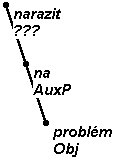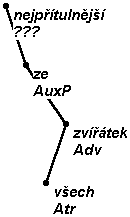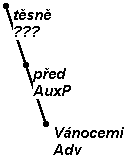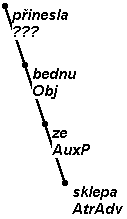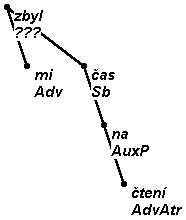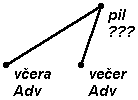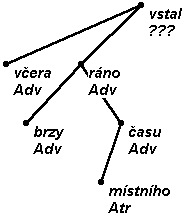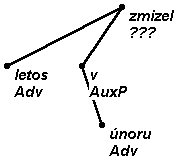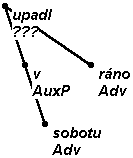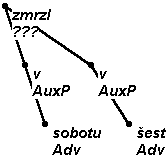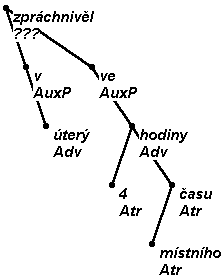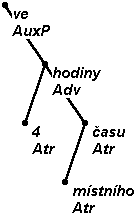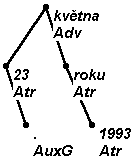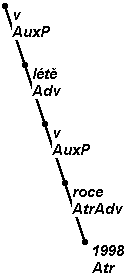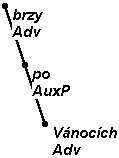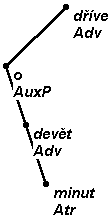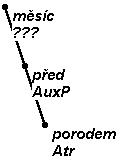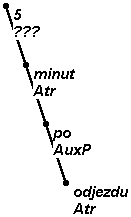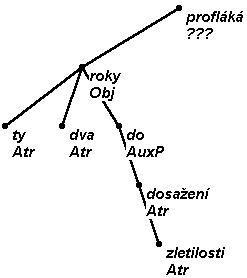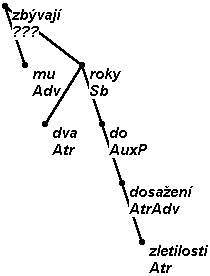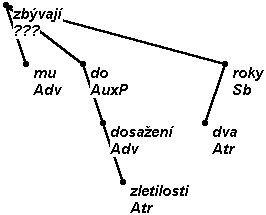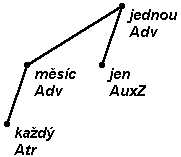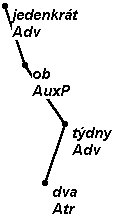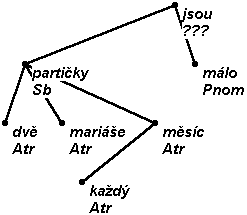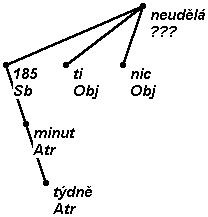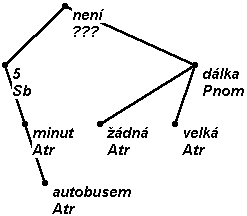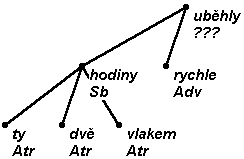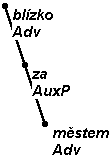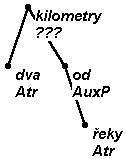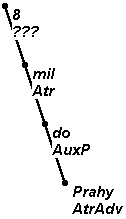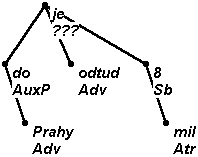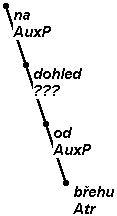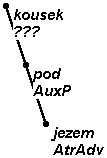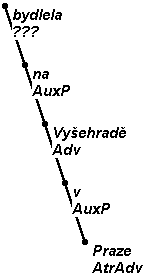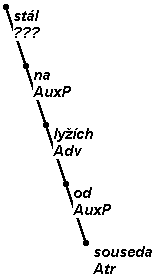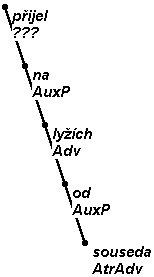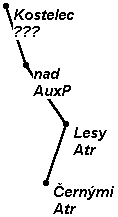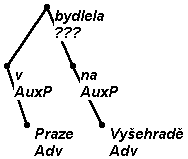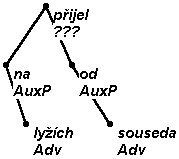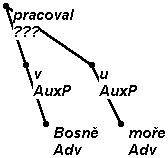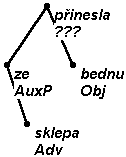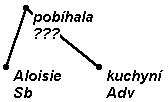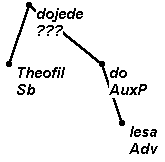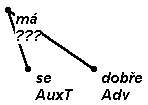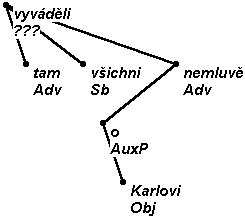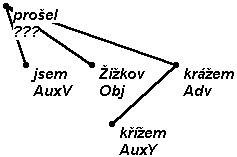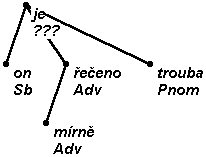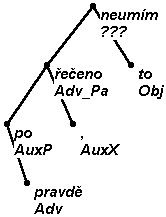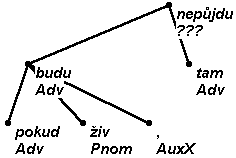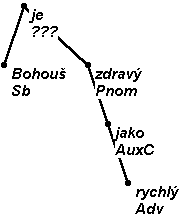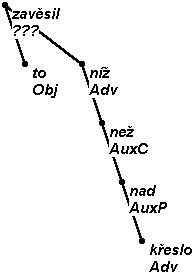After a specification of adverbials in Specification of adverbials the so-called combined functions are mentioned in Combined functions and different problems with the determination of adverbials are discussed: temporal adverbials ( Problematic cases of temporal modifications), combination of more such adverbials side by side (Two and more adjecent temporal modifications in the sentence), temporal modifications with relation to the situation (Temporal modification relative to an event), adverbials expressing repetition (Adverbial of temporal repetition and Temporal adverbial expresseding repetition lexically), temporal adverbials modified by a specification of speed (Temporal adverbial modified by stating the rate of speed). Adverbials of location expressed in relation to the place are discussed in Local adverbial relating to some place. The boundary between Adv and Atr is often difficult to be drawn; these situation are described in The boundaries of Adv and Atr.
The means of expressions are discussed in Expression of adverbials: nouns in Adverbial expressed by means of a noun, adverbs in Adverbial expressed by an adverb, adverbs in collocations in Adverbial expressed by an adverb phraseologism, infinitive in Adverbial expressed by an infinitive and by a subordinate clause in Adverbial expressed by a subordinate clause. A special type of expression is that with the conjunctions jako (as) and než (than), which is illustrated in Adverbial expressed by a clause (or a group) with conjunctions jak(o) - as, než(li) - than.
The section Kinds of adverbials according to meaning is devoted to a more detailed description of adverbials according to their meaning, since each of such a subclass has forms of its own: local (Adverbial of place), temporal (Adverbial of time), manner (Adverbial of manner), extent (Adverbial of measure), means (Adverbial of means), regard (Adverbial of respect), causal (Adverbial of cause), consequence (Adverbial of consequence), aim (Adverbial of purpose), condition (Adverbial of condition), concession (Adverbial of concession) and a special class of inheritance (Adverbial of inheritance).
Adverbials express the circumstances and relations such as location, time, manner, comparison, extent, means, cause, consequence, regard or aim. In our analytic scenario, all adverbials have the afun Adv and are not subclassified any further.
Some modifications understood by Šmilauer as adverbials are treated here as objects (Obj). This concerns modifications expressing origin and result of the action rendered by the verb (see Object of the type Origin and Result), which are characterized by Šmilauer as not expressable by a subordinate clause; however, in our approach they are considered to be valency slots and as such they belong to the verbal frame.
Emphasized modifications are Obj:
Adverbials modify a verb, an adjective or an adverb, its form is given by the rection of the governing element.
A special attention is to be devoted to the discrimination between Obj and Adv. A given modification is an adverbial, if it answers an adverbial question where?, where to?, from where?, how long?, when?, for what purpose?, why?, how? etc. and if verbal rection is not concerned (i.e. in case of rection, the given modification is an object and answers questions on morphological cases: who? for Nominative, of whom? for Genitive etc.). Abstract or metaphorical meanings tend to be determined as Obj (see zaplést se do intrik to get involved in intriques: this is not a location).
But:
Adjectives (esp. deverbatives) also may be modified by objects (plný něčeho full of something).
Adjectives may be, of course, modified by adverbials (Adv) as well. Such an adverbial itself often functions as an adverbial. If two adverbials occur in a sentence side by side, it might be difficult to decide whether they are independent of each other or if one modifies the other, as in the following examples. See Problematic cases of temporal modifications and Problems of local adverbial on a discussion of the relation between two adverbials.
The dependent adverbial is emphasized:
Combined ('slashed') functions in general are described in detail in Combined functions. In the present section only those of them that concern adverbials, i.e. AtrAdv and AdvAtr.
Combined functions are used in cases when the given node may obtain either of the possible functions in the given context without any change of meaning (i.e. the sentence is not strictly ambiguous as for the function of the given node).
The functions AtrAdv and AdvAtr are thus used in case the node concerned may be either an adverbial Adv of its predicate or an attribute of some lower node in the tree. If the annotator's intuition prefers the attributive interpretation, s/he assigns the function AtrAdv; in the opposite case s/he assigns AdvAtr.
In both cases, the given node will always depend in that position in which it would be placed if it were an Atr; it will never depend on the verb.
The solution presented in this section does not claim to be a theoretical one, it is a mere convention.
In case the sentence contains several temporal adverbials, they are hung as sisters. This case is illustrated by the first six examples.
The two mutually independent adverbials are emphasized.
If the given adverbials are not considered to be mutually independent, it is necessary to determine the direction of the relation of dependency. The first factor to be taken into account is morphology; the following rules should be applied:
Rule 1: If the governing node is a morphological adverb, both the governing and the depending adverbial are assigned the afun Adv.
The governing node can be a part of a meaningful question, e.g. when in the evening?, or when yesterday?.
The repertory of words that can modify adverbs is rather small, since the adverbs mostly are placed as sisters. From the syntactic point of view, these words are often ambiguous: e.g. the word brzo in the construction brzo ráno is an equivalent of English early (early in the morning) and depends on the noun; however, it can also stand alone, if it has the meaning of English soon.
The dependent word is emphasized.
Rule 2: If the governing node is a noun (with or without a preposition) and the dependent node is a noun in the Genitive case or accompanied by a preposition, and this node evidently has the function of an attribute (answering the question which?), it gets the afun Atr. Cases with nouns in Genitive are quite clear; in case the annotator hesitates, the combined afun AtrAdv or AdvAtr can be assigned.
The dependent Atr's are emphasized.
The function of the governing node is determined by its function in the given sentence.
Let us demonstrate two possibilities how to represent two adjacent temporal modifications:
-
The governor is an adverb, the depending member is Adv (it answers such questions as how soon? how immediately?, by what sooner?). The dependent adverb is emphasized:
-
The governor is a noun, the dependent is its Atr; depending on the context, it may be also an AtrAdv or AdvAtr, and in some special cases (determined by the valency of verbs) also just Adv or Obj; notational convention: the noun attached by prepositions před (before) and po (after) are always Atr.
The dependent is emphasized:
In the adverbials of repetition with words such as vždy (always), kolikrát (how many times), x-krát (x-times), tolikrát (so many times) (multiples), the ...krát (...times) figures as the governing element, on which the expression of interval (rendered by an adverb or prepositional construction) depends. (The question is: how often, how many times?)
The dependent Adv emphasized:
Adverbs of repetition (denně daily, ročně yearly,...) and prepositional groups such as každou hodinu (every hour) or za rok (in a year), are primarily classified as Atr, depending on a noun (unit).
Such a potential Atr can be used as Adv and may be assigned AtrAdv/AdvAtr as well, according to usual rules (5000 Kč daily).
If distance is specified by means of time + speed, the modifying part constitutes an Atr of the time unit (it is being suspended under this unit, rather than on the numerical expression). With minutes by bus, the question runs, e.g.: what minutes? However, this differs from an Adv, present, e.g., in jel tam 5 minut autobusem (he went there 5 minutes by bus), in which autobusem (by bus) is Adv dependent on the verb.
The rules are analogous to the rules of temporal adverbial dealt with in the part Temporal modification relative to an event.
In what follows two possibilities of representing two contact local adverbials are described.
-
The governing member is an adverb, the subordinate member being thus Adv (questions: how near? how close? how deep? by what/by how much further/aside?).
-
The governing member is a noun, the subordinate member being its Atr; according to context it also can be AtrAdv/AtrObj, consequently in some cases Adv/Obj (in accordance with verb valency), in agreement with the rules of annotation (questions: what kilometres? what sight? what piece?).
Convention: od (from) (if the case is not a valency, etc.) is only Atr.
The dependent member with a different afun is emphasized.
If two nouns (as the case may be, with a preposition) come together, that one which potentially depends on the other may become either really the other's Atr (AtrAdv, AdvAtr), or its sister Adv.
The potentially governing member obtains its function according to context. The potentially dependent member can become its Atr (AtrAdv, AdvAtr) provided it immediately follows that governor in the word-order (ex. (1) - (5)). A non-agreeing attribute preceding the governing word is not regarded as Atr but for exceptional cases created by valences of nouns (interest in, time for, time to, will to, thought of,..., see Non-agreeing attribute in a non-projective position in the sentence). In these cases it is regarded as Atr in spite of the possibility of causing non-projectivity of the tree. If the potentially dependent member cannot become an Atr (AtrAdv, AdvAtr), it is suspended as Adv alongside the potentially governing member (exx. (6) - (9)).
Explanation:
An adverbial can be expressed by means of a noun in an indirect case, simple or prepositional.
Note
As regards prepositional cases, Adv is assigned only if verbal government ("rection") is excluded (e.g. in nesouhlasil se smlouvou - he did not agree to the contract - the prepositional group is governed by the verb and it gets Obj).
The described expression of Adv is printed in emphasized types
In addition to current adverbs (ex. (1)) we also regard as Adv absolute (discrete) transgressive constructions (i.e., those that neither agree nor have a subject in common with the verb, ex. (2)). The common transgressives, however, fulfil the function of complements (see the part Complement expressed by a transgressive).
The absolute transgressive constructions mentioned above are prototypically separated by a comma; then they are regarded as parenthesis with afun Adv_Pa (see A syntactically incorporated sentence part with <afun>_Pa).
The described expression of Adv is printed in emphasized types
In Collocations, phraseologisms (phrasemes) we describe how collocations are to be represented and what is regarded as a collocation in our conception. Since most of the collocations fulfil functions of adverbials, this phenomenon is dealt with here as well.
The last word (from the point of view of word-order) of a collocation becomes its "representative" and as such it is assigned afun Adv. The remaining words depend on it and obtain afun AuxY.
As a rule, the infinitive expresses condition. In the protoypical case, it is separated by a comma and then it is regarded as parenthesis with afun Adv_Pa (see A syntactically incorporated sentence part with <afun>_Pa).
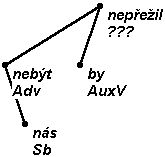
| nebýt | nás | by | nepřežil | ||||
| not-to-be | us | would | he-not-survived |
Within this category also the expression of Adv by a 'discrete' participle (příčestí nespojité) belongs. This, too, is usually separated by commas and therefore it is regarded as parenthesis (Adv_Pa - ex. (2)). The boundary between a discrete adverbial and an incomplete (parenthetic) clause with an elided copula is fuzzy. The latter case is described in An independent sentential form (containing a predicate) Pred_Pa: e.g. the sentence Před smrtí, neznámo proč, si koupil tramvajenku - (Shortly) before his death, for reasons unknown, he bought a tram pass.
A complete subordinate clause (with a verb) following the above conjunctions constitutes an Adv. A sentence member constitutes Adv only if it pertains in a close manner to the node placed immediately above the conjunction - it belongs to the same kind, which is why it could occur in the sentence in place of what it modifies (lépe než dobře - better than well, více než pět - more than five, široký jako vysoký - as wide as high). In other cases (zdravý jako ryba - as sound as a fish/bell) it represents an ellipsis (he is as sound as the fish/bell is sound) and the afun ExD is used.
This problem is dealt with in detail in Phrases of comparison with conjunctions jako (as), než (than). The use of afun ExD is specified in Ellipsis of predicate in clauses introduced by conjuctions jak(o) (like), než(li) (than).
The kinds of adverbials:
-
Adverbial expressed by means of a noun
accusative:
instrumental:
prepositional cases:
-
Adverbial expressed by means of a noun
genitive:
accusative:
instrumental:
chvílemi vyběhla na pavláčku times-Instr she-appeared on gallery time and again she appeared on the galleryprepositional cases:
A list of possible Czech prepositions in such constructions: do, během, k, kolem, koncem, mezi, na, o, ob, od, okolo, po, pod, pro, před, přes, při, skrze, uprostřed, v,z, za.
-
Adverbial expressed by a subordinate clause
A list of possible conjunctions in such constructions: když, až, zatímco, mezitímco, pokud, dokud, jakmile, jak, sotva(že), leda(že), kdykoli, než.
Manner can be expressed directly, by comparison and by effect.
Directly:
-
Adverbial expressed by means of a noun
instrumental:
prepositional cases:
Comparison:
-
Adverbial expressed by means of a noun
instrumental:
nespokojenost vzplane požárem dissatisfaction will-flare-up conflagration-Instr dissatisfaction will flare up in a conflagrationprepositional cases:
vypadá proti své choti dost nepatrně s/he-looks against his wife rather insignificant he looks rather insignificant compared with his wifeA list possible Czech prepositions in these constructions: proti, oproti, na rozdíl od, ve srovnání s
-
Adverbial expressed by a clause (or a group) with conjunctions jak(o) - as, než(li) - than
Effect:
Measure can be expressed directly, by comparison, effect, restriction or by difference.
Directly:
-
Adverbial expressed by means of a noun
accusative:
(the case is accusative with numerical data - see Expression with numerals, figures in different functions)prepositional cases:
-
Adverbial expressed by an adverb
Comparison:
-
Adverbial expressed by means of a noun
genitive:
instrumental:
prepositional cases:
bohatství snů roste úměrně s množstvím pocitů abundance of-dreams grows in-proportion with quantity of-feelings A list of possible Czech prepositions in these constructions: proti, nad, od, s, úměrně s
-
Adverbial expressed by a clause (or a group) with conjunctions jak(o) - as, než(li) - than
Effect:
-
Adverbial expressed by means of a noun
prepositional cases:
A list of possible Czech prepositions in these constructions: (až) do, (až) k, (až) na
Restriction:
-
Adverbial expressed by means of a noun
prepositional cases:
A list of possible Czech prepositions in these constructions: kromě, vyjma, s výjimkou, mimo, (až) na
Difference:
-
Adverbial expressed by means of a noun
prepositional cases:
Means can be represented by aid or measure.
Aid:
-
Adverbial expressed by means of a noun
instrumental:
cvrnkali sklenkami o mísy they-were-clinking glasses against bowls they were clinking their glasses against the bowlsNote
with verbs in passive voice the means (aid) becomes actor, i.e., Obj (byl přivítán předsedou - he was welcomed by the chairman)
prepositional cases:
A list of possible Czech prepositions: na, o, po, skrze, v, za, pomocí, prostřednictvím
Measure:
-
Adverbial expressed by means of a noun
instrumental:
prepositional cases:
A list of possible Czech prepositions in these constructions: podle, dle, po, z, úměrně, na podkladě, na základě, v souhlasu s, v souladu s, soudě dle.
-
Adverbial expressed by means of a noun
instrumental:
This construction occurs with such verbs as rovnat se, různit se, lišit se, přizpůsobit se (equal, differ, differentiate, adapt), etc., with relative adjectives and with the word groups být (stávat se) něčím, (nějakým) - be (become) st.(some)
prepositional cases:
A list of possible Czech prepositions: (co) do, k, na, naproti, od, oproti, pro, proti, při, s, stran, u, v, vůči, ohledně, z hlediska, vzhledem k, vzhledem na, se zřetelem na, v souhlase s, v souvislosti s, ve spojitosti s, ve srovnání s
-
Adverbial expressed by a subordinate clause
co ho pamatuji, byl spořádaný člověk as him I-remember he-was decent man as far as I remember him, he was a decent manConjunctions pokud and co (pokud jde o, pokud se týče) - as far as (... is concerned) are used.
This adverbial concerns expression of stimuli, motives or causes of states and activities, obstacles or symptoms on the basis of which we infer that some action takes place.
-
Adverbial expressed by means of a noun
accusative:
instrumental:
prepositional cases:
A list of possible Czech prepositions: na, pro, z, za, k, od, nad, po, při, skrz, v, u, následkem, v důsledku, dík (díky), kvůli, za příčinou, vzhledem k.
-
Adverbial expressed by a subordinate clause
A list of possible Czech conjunctions: jak, jelikož, když (coll.), poněvadž, protože, (proto)že.
Consequential connection is usually expressed by parataxis (e.g., v žaludku mu kručelo, proto se najedl (his stomach was rumbling, therefore he ate his fill) or v hlavě mu zvonilo, pročež se napil (there was a buzz in his head, which is why he downed a drink)). These cases are represented as coordination (see Coordination (sentential, of sentence parts) Coord, <afun> _Co).
Hypotactical expression of consequence is less frequent; the conjunction takže (so that) is used.
-
Adverbial expressed by means of a noun
prepositional cases:
A list of possible Czech prepositions: k, na, pro, do, od, v, za, kvůli, za příčinou, v zájmu, za účelem -
Adverbial expressed by a subordinate clause
-
Adverbial expressed by means of a noun
prepositional cases:
-
Adverbial expressed by an adverb
Some adverbials (prostě, zkrátka - put simply, in short) represent rather a degraded parenthesis; they are marked as AuxY.
-
Adverbial expressed by an infinitive
-
Adverbial expressed by a subordinate clause
A list of possible Czech conjunctions: -li, jestli(že), jak, pakli(že), když, pokud, kdyby, když(by).
-
Adverbial expressed by means of a noun
prepositional cases:
A list of possible Czech prepositions: přes, při, (i) v, mimo, proti, vzdor, navzdory. -
Adverbial expressed by a subordinate clause
A list of possible Czech conjunctions: třebaže, ač, ačkoliv, třeba (i), třebas, třebaže, jak, jakkoliv, přestože, (přesto)že, (i) když, (ani) když, byť (i), ať, nechť, aniž .
Inheritance represents a special kind of Adv, which can be expressed by the way exemplified below only (a construction od dědečka mu zbyly knihy - from the grandfather books have been left for him - will be marked as Obj).
-
Adverbial expressed by means of a noun
prepositional cases:

